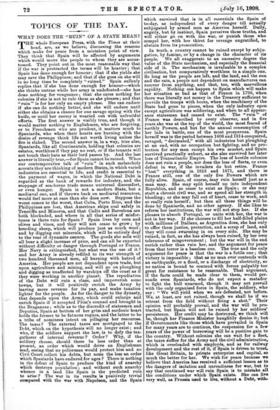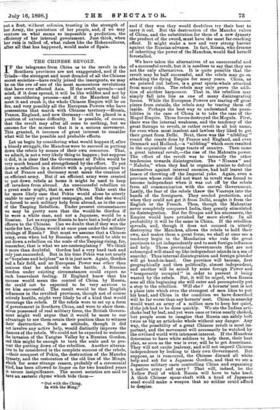TOPICS OF THE DAY.
'WHAT DOES THE "RUIN" OF A STATE MEAN? THE whole European Press, with the Times at their head, are, as we believe, discussing the reasons which make for peace from a mistaken point of view. They think that Spain will be affected by arguments which would move the people to whom they are accus- tomed. They point out in the most reasonable way that if the war is protracted the terms will be heavier ; that Spain has done enough for honour ; that if she yields she may save the Philippines; and that if she goes on she will in no long time be completely " ruined." Spain sullenly replies that if she has done enough for honour—which she thinks untrue while her army is undefeated—she has done nothing for vengeance ; that she cares nothing for colonies if she is not to rule them as she pleases ; and that " ruin " is for her only an empty phrase. She can endure if she can do nothing better, and she will endure until either she obtains a chance for one savage spring with the knife, or until her enemy is wearied out with unfruitful efforts. The first answer is visibly true, and though it would matter nothing to Englishmen, who are forgiving, or to Frenchmen who are prudent, it matters much to Spaniards, who when their hearts are burning with the desire of revenge think life not worth living unless the fire is slaked. The second answer is, in a way, true also, Spaniards, like all Continentals, holding that colonies are estates, worthless if they pay no rent, or if the tenants will not touch their hats as their lord passes by. And the last answer is literally true,—for Spain cannot be ruined. When our contemporaries talk of "ruin" in such melancholy accents they are thinking of modern States, in which varied industries are essential to life, and credit is essential to the payment of wages, in which the National Debt is regarded as the bank of rewards for industry, and the stoppage of sea-borne trade means universal discomfort, or even hunger. Spain is not a modern State, but a medimval one, and if thrown back on medimval resources, would feel more at ease than she does now. Suppose the worst comes to the worst, that Cuba, Porto Rico, and the Philippines are lost, that American ships coal safely in Teneriffe and Minorca, and that Cadiz and Barcelona are both blockaded, and where in all that series of misfor- tunes is there ruin for Spain ? Spain lives by corn and olives and vines, and they will not cease to grow ; by breeding sheep, which will produce just as much wool ; and by digging out minerals, which will be entirely deaf to the roar of dynamite cannon. The goods she sells will all bear a slight increase of price, and can all be exported without difficulty or danger through Portugal or France. Her Navy is extinguished, but what was the use of it ? and her Army is already refilled to its war strength of two hundred thousand men, all burning with hatred of America. Her people are not dependent upon trade, but upon agriculture and mining, and will go on ploughing and digging as unaffected by warships off the coast as if they were working in another planet. The repudiation of the Debt will ruin a class, and impoverish some towns, but it will positively enrich the Army by leaving more revenue for its pay, and make taxation lighter for the people. As for the danger to the dynasty, that depends upon the Army, which could enlarge and enrich Spain if it accepted Prim's counsel and brought in the Braganzas ; while as to the discredit of statesmen and Deputies, Spain at bottom of her grim and sardonic heart holds the former to be fatuous rogues, and the latter to be a tribe of nominees intent on pillaging her resources. The taxes ? The external taxes are mortgaged to the Debt, which on the hypothesis will no longer exist ; and who, if the soldiers support the law, is to defy the tax- gatherer of internal revenue ? Order ? Why, if the soldiery choose, should there be less order than at present, an order which would drive an Englishman mad, seeing that no policeman would protect him and no Civil Court collect his debts, but none the less an order which Spaniards have endured for ages ? There is nothing in the defeat of Spain to produce the kind of anarchy which destroys population ; and without such anarchy whence in a land like Spain is the predicted ruin to arise ? The war in its results is positively trivial compared with the war with Napoleon, and the Spain which survived that is in all essentials the Spain of to-day, as independent of every danger till actually subjugated by armed men as America herself. Dully, angrily, but by instinct, Spain perceives these truths, and will either go on with the war, or punish those who compel her, with her thirst for revenge ungratified, to abstain from its prosecution.
In truth, a country cannot be ruined except by subju- gation, by famine, or by a change in the character of its people. We all exaggerate to an excessive degree the value of the State mechanism, and especially the financial side of it. The mechanism is invaluable to a complex civilisation, but comparatively worthless to a simple one. So long as the people are left, and the land, and the sun, and the rain, a people not dependent on manufactures can recover from anything, and that, too, with marvellous rapidity. Nothing can happen to Spain which will make her situation so bad as that of France in 1796, when there was literally not money in the Treasury sufficient to provide the troops with boots, when the machinery of the State had gone to pieces, when the only industry open except agriculture was soldiering, and when to all appear- ance statesmen had ceased to exist. The "ruin " of France was described by every observer, and in five years she was at the top of the world, the most feared of earthly Powers, and but for the annual consumption of her lads in battle, one of the most prosperous. Spain herself was in the period between 1808 and 1814 conquered, ravaged, " decimated," with all industries but ploughing at an end, with no occupation but fighting, and no pro- tection for any man except his own musket, and Spain survived practically unhurt, as she also survived her later loss of Transatlantic Empire. The loss of hostile colonies does not ruin a people, nor does the loss of fleets, or even defeat in war, if the invaders do but retire. France "lost" everything in 1815 and 1871, and there is France still, one of the only five Powers which are- fully alive. Spain, of course, may ruin herself just as a. man may. She may split herself up into independent Republics, and so cease to exist as Spain ; or she may start a chronic civil war, and so spend all her strength in bleeding; or she may fall out of heart, cease to work, and so really ruin herself ; but then all these things will be done by Spaniards, and no other agency. If she likes to. reform her institutions, the war will not stop her. If she pleases to absorb Portugal, or unite with her, the war is not in her way. If she chooses to fill her half-filled plains with millions of Italians, as Argentina does, she has only: to offer them justice, protection, and a scrap of land, and they will come swarming in on every side. She may be ruined, in fact, as she has always been ruined, by her own tolerance of misgovernment ; but the war will in the end enrich rather than ruin her, and the argument for peace from that terror is a baseless one. The true and the only argument for peace is that the war is a futile one ; that victory is impossible ; that as no man ever contends with an earthquake, or a flood, or a discharge of electricity, so no nation is bound to contend with forces palpably too great for resistance to be reasonable. That argument, if the facts could be made clear to them, would per- suade even Spaniards, who do not expect a matador to fight the bull unarmed, though it may not prevail with the only organised force in Spain, the soldiery, who say : " We will yield when we are defeated, not before. We, at least, are not ruined, though we shall be if we retreat from the field without firing a shot." Their opinion will probably prevail, and the war will be pro- tracted, but Spain will not be ruined by her soldiers persistence. Her credit may be destroyed, we think will be, though her Finance Minister haughtily denies it; but if Governments like those which have prevailed in Spain for many years are to continue, the suspension for a few years of the power of borrowing will be a positive gain to the country. Without colonies she can wait for a fleet, the taxes suffice for the Army and the civil administration, which is overloaded with employes, and as for railway development and the rest of it, if Spain is driven to trust, like Great Britain, to private enterprise and capital, so much the better for her. We wish for peace because we believe that America has received a sufficient lesson as to the dangers of isolation and unreadiness for war, but to say that continued war will ruin Spain is to mistake all the conditions under which Spain exists. She can live very well, as Prussia used to live, without a Debt, with. out a fleet, without colonies, trusting in the strength of her Army, the patriotism of her people, and, if we may venture on what seems so impossible a prediction, the efficiency of her internal government. Just think, when her ruin is talked of, what rulers like the Hohenzollerns, after all that has happened, would make of Spain.



































 Previous page
Previous page